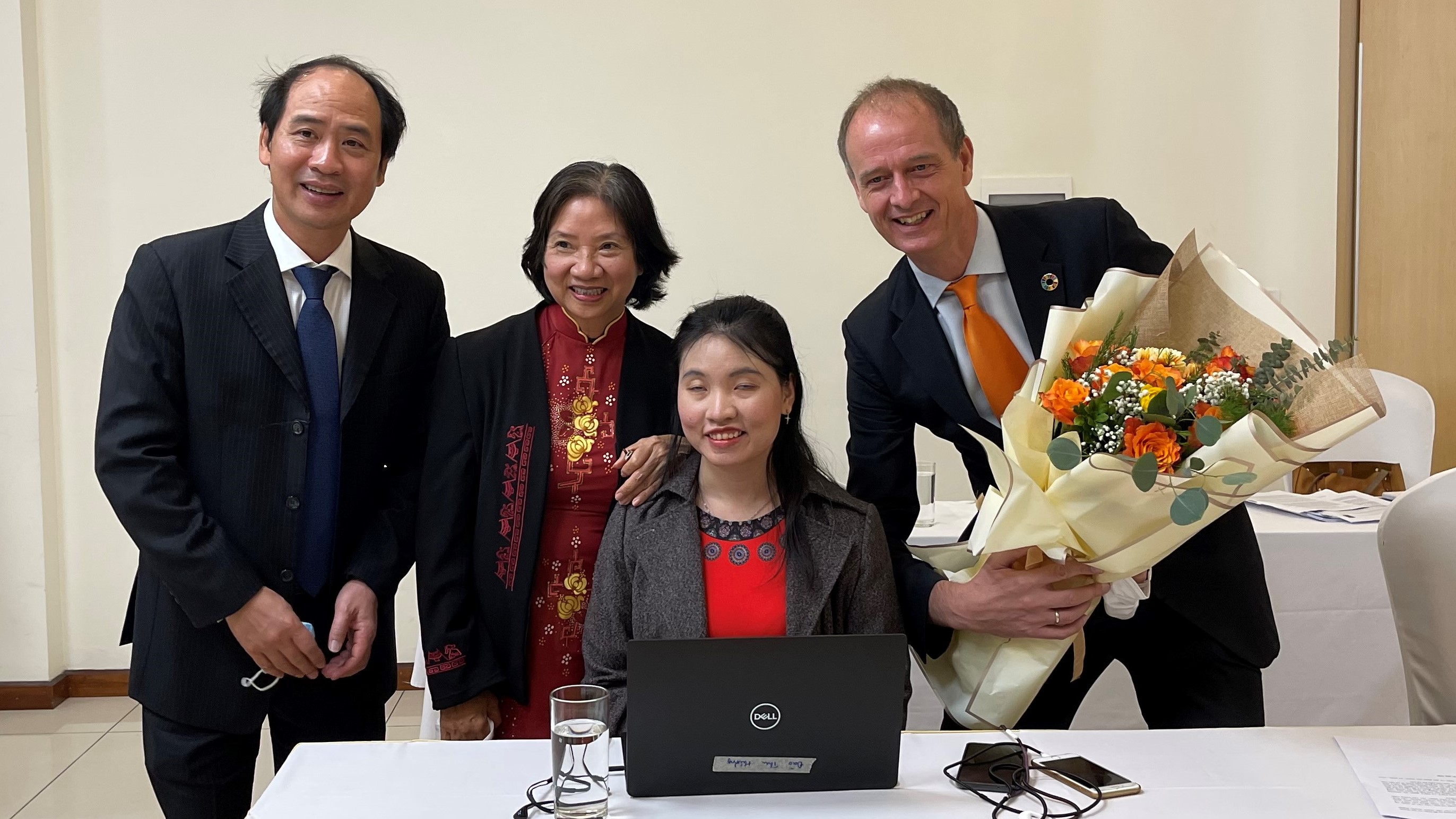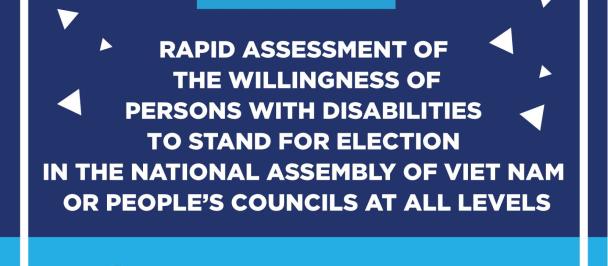by Patrick Haverman, UNDP Deputy Resident Representative in Viet Nam
Leave no persons behind, with or without disabilities
December 3, 2021
(from left to right) Vice Minister of Labor, Invalids and Social Affairs Nguyen Van Hoi; Chairperson of Ha Noi's Association of People with Disabilities Duong Thi Van; UNDP Disability Rights Officer Dao Thu Huong; and UNDP Deputy Resident Representative Patrick Haverman
In 2017 when serving in China, I wrote a blog post with this title; today, more than four years later, I repeated these words at the celebration of the International Day of Persons with Disabilities in Viet Nam. In both countries, progress has been made, and more is needed.
I am proud that in UNDP Viet Nam, we walk the talk – in our diversity, we have staff with different types of disabilities. The Green One UN House, our shared office, applies the universal design, which is accessible for everyone.
Beyond UNDP, despite commitments and effort, inequality remains a huge problem in the world. COVID-19 has presented a major set-back: a 2021 UNDP-supported survey found that persons with disabilities have been disproportionately impacted. Some 74% of respondents had their work hours reduced by up to four weeks per month, which is almost 1.5 time higher than those reporting their work hours reduced (49%) in our first Rapid Assessment conducted of April 2020; The number of respondents who had their income under only 2 million VND in August 2021 was also 16% higher than that before January 2020. It is understandable that savings cannot sustain their life as stated by 33% of the respondents this year. UNDP recently did a rapid impact assessment and an assessment of the 2nd support package of the Government, finding that the quickest way to deliver support is to provide an immediate cash benefit to specific groups, including people with disabilities.
We know that 2021 has been an extremely difficult year for the people of Viet Nam, so we must redouble our efforts to address the underlying inequalities that mean persons with disabilities are so severely affected. Today, while celebrating the International Day of Persons with Disabilities, we were reminded that leadership and participation of persons with disabilities should be put in the center of our thinking to build forward better.
From all over Viet Nam, organizations of and representing 6.2 million persons with disabilities (7% of the population) shared their expertise and voiced their views on how we can move forward. The Government of Viet Nam is committed to ensuring that persons with disabilities can fully participate in society and equally enjoy their fundamental rights. The Government enacted the Law on Persons with Disabilities in 2010, ratified the Convention on the Rights of Persons with Disabilities in 2015, and issued Decision 1100/QD-TTg approving the National Plan to implement the CRPD and other guiding documents in 2016. Even so, there is room for improvement and UNDP, together with the National Council on Disability, Ministry of Labor, Invalids and Social Affairs and persons with disabilities, is working on consolidated inputs for the revision on the Law on Persons with Disabilities.
However, a law is only as strong as its enforcement. The efforts of the UN, therefore, also focus on the implementation of the law and the implications for a province, municipality, company or individual if they do not apply it. Where are the carrots and the sticks to make sure, not just that the law is enforced, but that implementation leads to progress, for example in access to justice, employment, and access to information? In this regard, UNDP is supporting organizations of persons with disabilities across the country to effectively use monitoring tools provided by OHCHR to well monitor the implementation of CRPD and the Law on Persons with Disabilities.
In UNDP we follow the slogan of the movement of persons with disabilities: “Nothing about us without us.” Experience has shown us that when persons with disabilities are not able to participate in making and implementing policies, those seeking to take decisions on their behalf cannot do so successfully.
Crucially, persons with disabilities should not only be engaged in disability-focused policies. Their participation and needs should be mainstreamed into all national development policies. As UNDP, we strongly support persons with disabilities to realize their full potential to contribute to the national socio-economic recovery from the COVID-19 pandemic.
I hope that in another four years I can write a blog describing how as a world we have made a leap forward, definitively dealt with the COVID crisis, drastically reduced inequality, advanced on the path to zero emissions and ensured that persons with disabilities are leaders in our efforts toward sustainable development, not just beneficiaries. Every difficult journey starts with the first step. To make that vision a reality, a successful revision of the Law on Persons with Disabilities, with meaningful participation of persons with disabilities in the whole law-making process, would be a good one!

 Locations
Locations


